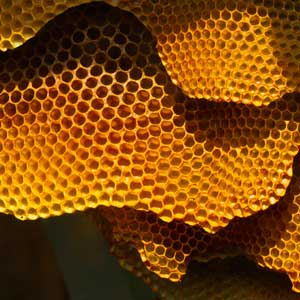From io9.com:

Honey is magic. Besides its delicious taste, it’s pretty much the only food that does not spoil while in an edible state. But why, exactly, doesn’t honey go bad?
Honey has a lot of pretty incredible properties. It’s been used and investigated for medicinal properties for a long time, especially as a treatment for open wounds. Herodotus reported that the Babylonians buried their dead in honey, and Alexander the Great may have been embalmed in a coffin full of honey.
The oldest honey ever found was unearthed in Georgia, and dates back over 5,000 years. So, if you found yourself in possession of some 5,000 year-old honey, could you eat it? Well. . .
Chemical Properties of Honey
Honey is a sugar. You may have heard all sorts of things about the health benefits of substituting honey for sugar, which may or may not be true. While honey isn’t the same as regular, granulated, white sugar, it’s still a sugar. And sugars are hygroscopic – they don’t contain much water in their natural state. And very few bacteria and microorganisms can live in the resulting low-moisture environment.
Amina Harris, executive director of the Honey and Pollination Center at the Robert Mondavi Institute at University of California, Davis says, “Honey in its natural form is very low moisture. Very few bacteria or microorganisms can survive in an environment like that, they just die. They’re smothered by it, essentially.” The fact that organisms can’t survive long in honey means they don’t get the chance to spoil it.
Another thing that sets honey apart from other sugars is its acidity. Honey’s pH is between 3 and 4.5 (or, more precisely, 3.26-4.48), which also kills off anything trying to make a home in honey.
And there are a few factors behind honey’s low moisture content, including:

Bees
First, bees contribute to the low water content of honey by flapping their wings to dry out nectar. Second, the way bees get nectar into honey combs is by vomiting it there. This sounds really gross, but the chemical makeup of bees’ stomachs also contributes to honey’s long shelf-life. Bees’ stomachs have the enzyme glucose oxidase, which is added to the honey when the nectar is regurgitated. The enzyme and nectar break mix to create gluconic acid and hydrogen peroxide. The hydrogen peroxide is also a hostile force for anything trying to grow in honey. (Although, maybe not that effective in your cuts.)
Storage
This is important. The fact that honey is hydroscopic means that it has little water in its natural state but can easily suck in water if its exposed to it. If it does that, it could spoil. So the final key to honey remaining unspoiled is making sure it’s well sealed and stored in a dry place.

Crystallization
Related to storage is the problem of crystallized honey. NOTE: Honey that’s crystallized is not necessarily spoiled. Americans apparently see crystallized honey as “wrong,” so large packers filter honey to remove any particles which may lead to crystallization. Raw honey and organic honey doesn’t go through the process, but that doesn’t mean it’s going to spoil. Also, different honey has different rates of crystallization. So it may just be that the honey you have is more prone to crystallization.
So crystallization doesn’t mean there’s anything “wrong” with your honey — but if you don’t like it, the big tip is to not put your honey in the refrigerator. Below 52 °F, crystallization slows down, so feel free to freeze your honey. And at temperatures above 77 °F, honey resists crystallization best. But honey crystallizes most quickly at temperatures of between 50 and 59 °F. So, if you want to avoid having to heat your honey to remove crystals (apparently slow, indirect heat is best for that, by the way), avoid the refrigerator.
Caveat: Infants
So, yes, honey mostly doesn’t spoil. However, honey can contain spores of Clostridium botulinum. This isn’t harmful to adults and children over one year old, whose gastrointestinal tract is developed enough to deal with the spores. But children under one are at risk for infant botulism, so honey is not for your infant.
So could you eat 5,000 year old honey? Well, if it’s spent that time sealed and stored against moisture, sure. If it’s crystallized, it’s not spoiled, just heat it up and put it in your food of choice. Unless you’re under one year old. Then you’d have to wait.
Top image: Honey Comb Structure by Gavin Mackintosh/flickr
Other images, in order: Phillie Casablanca/flickr A bee @work by Andreas/flickr; Honey Trio by land_camera_land_camera/flickr;




